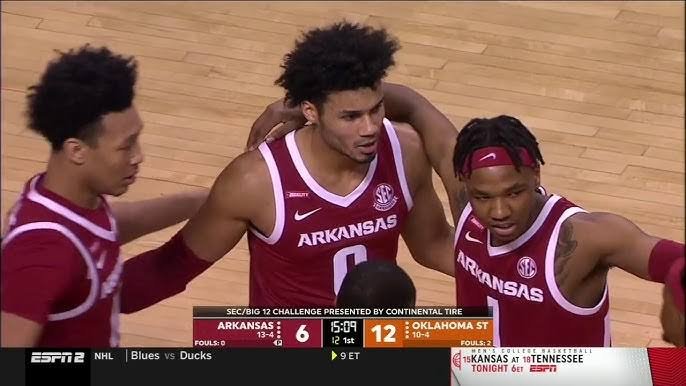Razorbacks Basketball’s Star Player Drops Bombshell: Shocking Move That Could Change College Hoops Forever
In a move that has sent shockwaves through the world of college basketball, the star player of the Arkansas Razorbacks, a top contender for Player of the Year honors, has made a surprising and groundbreaking decision that could potentially alter the landscape of college hoops. The athlete’s announcement, which has reverberated across social media, traditional media, and sports circles, is expected to ignite intense debate among fans, analysts, and fellow players alike. With implications that could be felt far beyond Fayetteville, Arkansas, this decision raises questions about the future of the NCAA and the direction the sport is headed in.
The player in question, whose name has become synonymous with Razorbacks basketball excellence, has revealed that they will bypass their final year of eligibility and declare for the NBA Draft early. The timing of the decision has stunned many, as the athlete was expected to be a cornerstone for the Razorbacks’ upcoming season, which was set to be one of their most anticipated campaigns in recent memory. This player has been instrumental in the Razorbacks’ success over the past few seasons, and their ability to elevate the team to new heights made them a fan favorite. Their decision to leave college basketball before finishing their career in Fayetteville marks the end of an era for the program.
For many, this move signals a seismic shift in college basketball. Historically, the NCAA has been the proving ground for future NBA stars, with top college players generally spending a minimum of three years in the system before being drafted. The notion of players forgoing their eligibility and heading straight to the professional ranks has long been debated, with many viewing it as a blow to the purity of college basketball. However, this player’s decision to leave college early could be the first of many, as the financial stakes of entering the professional game grow ever higher.
The motivations behind this surprising move are multifaceted. At the heart of the decision is the player’s aspiration to compete at the highest level. The NBA has become a global powerhouse, with massive salaries, sponsorship opportunities, and an audience that spans continents. The lure of professional basketball, coupled with the financial security that comes with being selected in the NBA Draft, is undeniable. For many top-tier college players, the chance to jump to the pros outweighs the benefits of another season in the NCAA, especially when the risk of injury in college ball looms large.
Moreover, the NCAA’s evolving landscape plays a significant role in shaping these decisions. The introduction of the NIL (Name, Image, and Likeness) rules has allowed college athletes to profit off their likeness, but it still doesn’t compare to the financial incentives offered by the NBA. With the growing trend of athletes leaving early for professional leagues, the question arises: is the NCAA still the best path for top players, or are they better off making the jump to the NBA sooner rather than later?
This player’s move also reflects the increasing influence of AAU (Amateur Athletic Union) basketball and other professional basketball development leagues that allow athletes to gain exposure, experience, and even financial compensation without having to stay in college for the full duration of their eligibility. In recent years, the emergence of programs like the NBA G League Ignite has provided another viable alternative to the traditional college route, allowing high school and one-and-done players to develop their skills while preparing for the NBA Draft. The options for top-tier talent have expanded significantly, and this star’s decision could set a precedent for future players.
From a team perspective, the Razorbacks now face a dilemma. Losing such a valuable player, one who has been pivotal to the team’s success, leaves a significant void in the roster. Head coach Eric Musselman, who has built a strong program in recent years, now must navigate the challenge of replacing a star player who was expected to be a key piece in the team’s quest for another NCAA tournament berth. The Razorbacks have a solid recruiting class, but the loss of this player leaves a considerable gap in experience and talent.
The broader implications of this decision reach well beyond Arkansas. It has the potential to reshape the way programs approach recruitment, player development, and the overall structure of college basketball. With the growing trend of players entering the professional ranks earlier, there may be a shift in how college programs structure their rosters. Coaches may increasingly need to prepare for a revolving door of talent, with players opting for the pros after only one or two seasons, rather than staying for four years and contributing to a more cohesive team dynamic. This could make the college basketball landscape more unpredictable, with top teams potentially having to rebuild every few seasons.
Additionally, this move raises important questions about the future of the NCAA itself. If top athletes continue to leave early, it could significantly alter the level of competition in college basketball. The most talented players may no longer feel the need to remain in the NCAA system, and the top-tier programs that rely on these athletes may struggle to keep up with the changing landscape.


